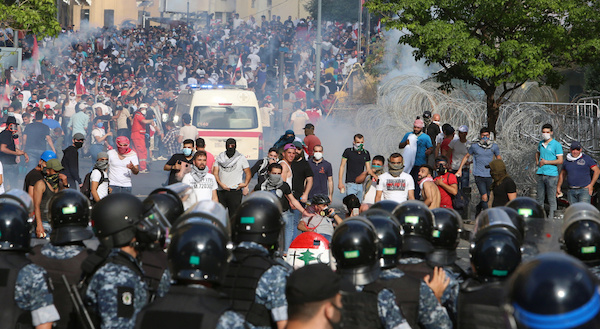
Demonstrators gather during a protest against the government performance and worsening economic conditions, in Beirut, Lebanon, on June 6, 2020. (Photo by Reuters)
Lebanese protesters have resumed their demonstrations, demanding the resignation of the ruling elite over its mismanagement of the acute financial crisis in Lebanon as the novel coronavirus pandemic and the resulting lockdown compound the economic hardship gripping the country.
Thousands of demonstrators, many wearing face masks and carrying the national flag, converged on Martyrs’ Square - historically known as al-Burj or Place des Cannons - in the central part of the capital, Beirut, on Saturday.
The protesters called for early parliamentary elections and tougher measures to fight corruption and return looted state funds.
Some participants threw rocks at security forces and smashed storefronts, prompting security forces to fire teargas canisters and rounds of rubber bullets to disperse the crowd. At least 35 people were reportedly injured.
You can sense that everyone is tired and the situation is very hard, especially the economy, so you can sense that people no longer want to be festive (in their protests). People are just angry, Marie-nour Hojaimy, a protesting lawyer, said.
Near the parliament building, a group of young men hurled rocks over cement barriers erected to seal off the area.
Lebanon is facing its worst economic crisis in decades. The Lebanese pound has continued to plummet against the US dollar, losing more than 60 percent of its value over the last weeks while sources of foreign currency have dried up.
The economic situation is fuelling inflation, which the Finance Ministry has estimated will reach 27 percent later this year.
Back in April, Lebanese Social Affairs Minister Ramzi Moucharafieh admitted that between 70-75 percent of the country’s population now need financial assistance.
Prime Minister Hassan Diab assured Lebanese citizens on April 16 that at least 98 percent of bank deposits will not be affected by any financial measures that his government plans to take.
Some economists have, however, cast doubts on such promises, terming them as out of touch with reality.
The government is seeking billions of dollars, but so far talks with the International Monetary Fund (IMF) have apparently made little progress.
The IMF predicts that Lebanon’s dire recession will be the third-worst in the world in 2020.
Diab took office in January after the protests that swept across the country last October toppled the previous government led by Saad al-Hariri.
SOURCE: PRESS TV
LINK: https://www.ansarpress.com/english/18274
TAGS:






























 online news tv
online news tv




